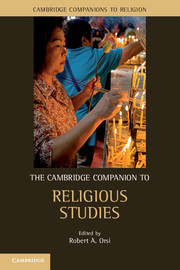Book contents
- Frontmatter
- Introduction
- Part one Religion and religious studies: the irony of inheritance
- Part two Major theoretical problems
- 5 Social order or social chaos
- 6 Tradition: the power of constraint
- 7 The text and the world
- 8 On the role of normativity in religious studies
- 9 Translation
- 10 Material religion
- 11 Theology and the study of religion: a relationship
- Part three Methodological variations
- Index
8 - On the role of normativity in religious studies
from Part two - Major theoretical problems
Published online by Cambridge University Press: 28 March 2012
- Frontmatter
- Introduction
- Part one Religion and religious studies: the irony of inheritance
- Part two Major theoretical problems
- 5 Social order or social chaos
- 6 Tradition: the power of constraint
- 7 The text and the world
- 8 On the role of normativity in religious studies
- 9 Translation
- 10 Material religion
- 11 Theology and the study of religion: a relationship
- Part three Methodological variations
- Index
Summary
Like other fields across the humanities and social sciences, religious studies grapples with the complex and often hidden relationships between descriptions and normative presuppositions and implications – roughly, between claims about what is and about what ought to be. For reasons concerning both its subject matter and the particular history of the field, however, debates about these issues in religious studies are particularly charged as well as particularly illuminating. Here, the issues have largely arisen in the context of larger debates over the appropriate substance, methods, and approaches in the academic study of religion. These debates, in turn, have often been framed in terms of the relation between religious studies and theology. Critics have repeatedly charged that the field remains tainted, that it has not yet escaped the die cast by its largely Protestant theological roots. For these critics, the field thus functions as a kind of liberal Protestant – or, at best, ecumenical – apologetics. Where earlier debates were concerned with obviously theological work being done in religious studies, recent scholarship has highlighted the more subtle endurance of Protestant presuppositions even in supposedly more pluralistic conceptions of the study of religion. From the other side, theologians decry an exclusion that they see as based in models of objectivity and rationality that are no longer defensible. Some of these theologians seek to transmute postmodern critiques of reason into tickets for readmission to the guild.
- Type
- Chapter
- Information
- The Cambridge Companion to Religious Studies , pp. 168 - 185Publisher: Cambridge University PressPrint publication year: 2011
- 7
- Cited by



